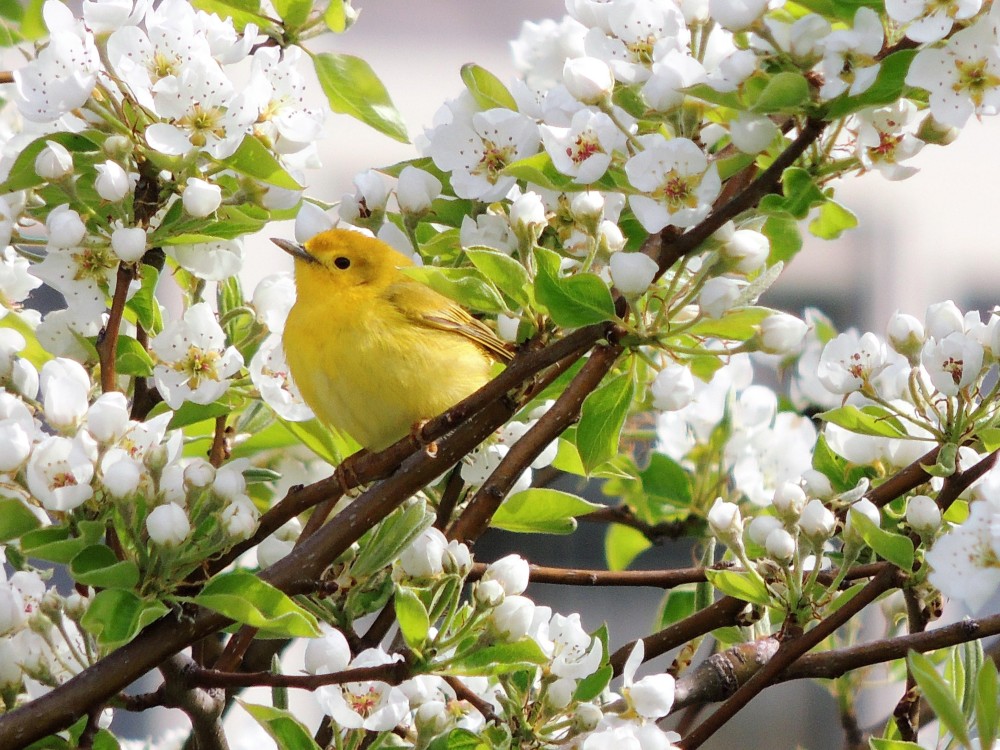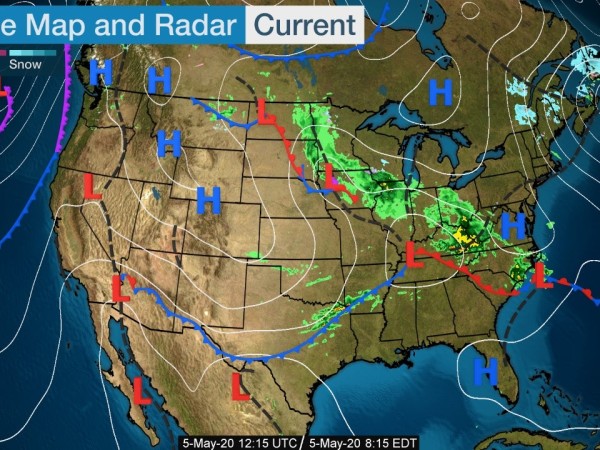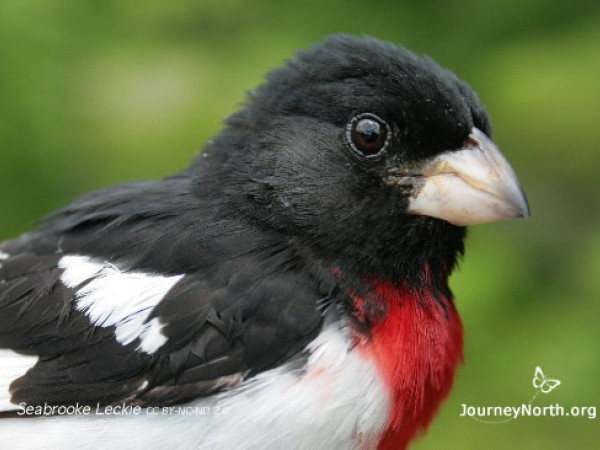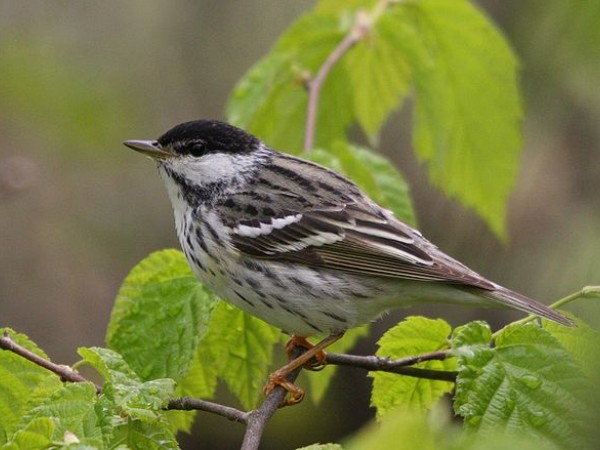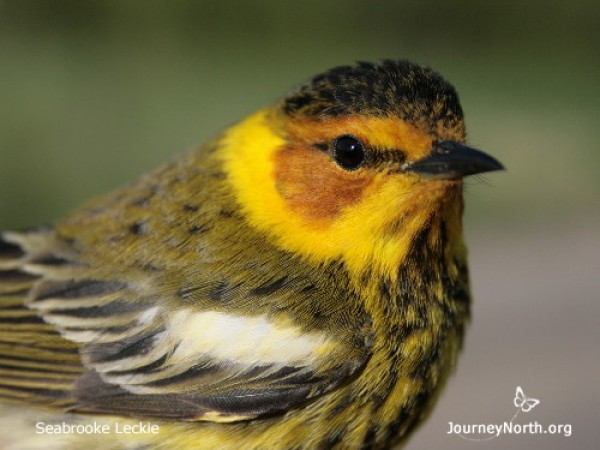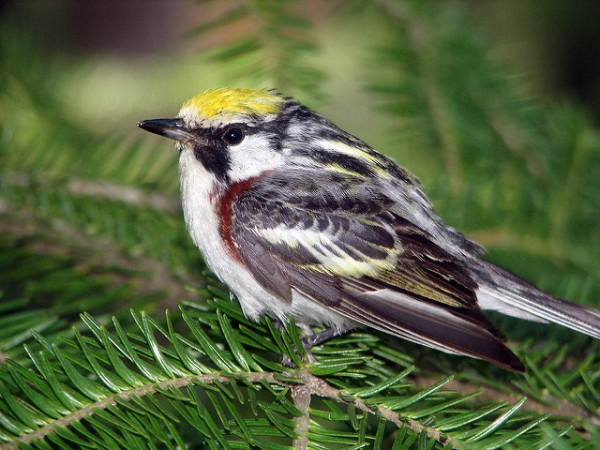Good Flying Conditions
Be Ready For World Migratory Bird Day on May 9th
Saturday, May 9th is World Migratory Bird Day! This day highlights the need to conserve migratory birds and protect their habitats.The theme of this year's World Migratory Bird Day (WMBD) is “Birds Connect Our World”.
In honor of WMBD, we encourage you to get outside this weekend – while following all health guidelines – and look for birds. Submitting your bird sightings to Journey North can improve our collective understanding of migration and how species respond to variation in weather conditions and changes in habitat availability. Every sighting matters.
Learn more about World Migratory Bird Day.
Letter from Dr. Aborn
Dear Journey North Readers,
Migration is rolling along, starting to slow in some places, but picking up in others. Last week, I mentioned a storm system that might have brought another fallout to the Gulf coast. The fallout never happened. Nonetheless, once the system passed, good flying conditions allowed birds to make a lot of progress north.
Tennessee Warblers, Blackpoll Warblers, and Cape May Warblers are common sights moving through the southern US, and Rose-breasted Grosbeaks are still plentiful. A friend of mine in Dalton, GA had 12 of them at his feeder! I saw my first Swainson’s Thrush over the weekend. Up in New England, Gray Catbirds, Baltimore Orioles, Chestnut-sided Warblers, Black-throated-blue Warblers, Blackburnian Warblers, and American Redstarts have all arrived, even as for north as Maine. In the Midwest, good flying weather allowed Ruby-throated Hummingbirds, White-eyed Vireos, Ovenbirds, Yellow Warblers, Indigo Buntings, and Gray Catbirds to make it to Minnesota and Wisconsin.
There has been a lot of migration out west as well. Swainson’s Thrushes were a common sight throughout California, and good numbers of Warbling Vireos were reported in California and Oregon. Birders in Idaho reported their first Western Tanagers, Black-headed Grosbeaks, and Lazuli Buntings. Violet-green Swallows marked the first arrival of migratory birds in Alaska!
I hope the migratory birds in the eastern US like it where they are as it appears they will be stuck there for a few days. If you look at the weather map, there is yet another storm system moving across the country. The system will bring big storms to the Midwest and South, and may even bring snow to New England. Behind the front, there are very strong north winds that will drop temperatures 30-40 degrees: birds will not be going anywhere for a while! Whenever one part of the country has a temperature extreme, it is not unusual for the other half of the country to experience the opposite. While the eastern US will be shivering, the western US will be baking. Those strong southerly winds will allow birds to continue streaming northward. By the weekend, conditions in the east will have moderated, and birds can continue their migration. Out west, a front will be moving in from the Pacific, grounding birds in that area.
There is still a lot happening – don’t put your binoculars away yet!
Take care.
David Aborn
Chuck Henrikson's Birding Report From UW-Madison Arboretum
"Tired of sitting around the house because of the pandemic? Now is the time to go out birding! There is an abundance of new birds to see and enjoy while practicing social and physical distancing." Read Chuck's latest birding report from the Arboretum.
Watch Baltimore Oriole Migration Unfold
Baltimore Oriole sightings continue to come in at a blistering pace. The pattern of migration becomes apparent through the Journey North Baltimore Oriole migration map: check out all the new sightings between April 25-May 5!
Thus far, the northernmost sighting has come from Maxbass, North Dakota.
From Maxbass, ND: Jill shared, "she [Baltimore Oriole] was happily splashing around in the bird bath and eating from the oranges I have had out. (04/26/2020)
From Du Bois, PA: Phillip said, “Spotted 2 males and one female Baltimore oriole. First year seeing them in my yard.” (05/02/2020)
From Wilmington, DE: Joseph spotted, "Our first ever Baltimore Oriole, seen at our seed feeder." (05/05/2020)
From St. Thomas, ON: Jody shared, “My daughter noticed our first Baltimore Orioles in the backyard today! They didn't go to the feeder (oranges/grape jelly) but just enjoyed the blossoms on our flowering tree!” (05/04/2020)
From Richmond, MN: Jim observed his, “first Baltimore Oriole of 2020, eating grape jelly.” (05/04/2020)
Out west, Bullock’s Orioles are being spotted at bird baths and feeders, providing quality backyard bird watching.
From Show Low, AZ: Carol said, “The [Bullock's] Oriole came to our bird bath to drink for the last couple of days. It is so beautiful.” (04/29/2020)
From Salt Lake City, UT: Jodi spotted, “first male Bullocks Oriole on backyard feeder. There is also a female.” (04/30/2020)
Barn Swallows Active in Canada
From Last Mountain Valley No 250, SK: Shirley noted, “Barn Swallows and Purple Martins gliding around at an old barn at the eastern boundary of the Last Mountain Lake Bird Sanctuary.” (05/02/2020)
Loons Spread Joy
From Hale, MI: Paul said, “Our loons are back! No sign of young ones - too early.” (04/29/2020)
Red-winged Blackbirds are Adaptable
From agricultural fields to urban environments, Red-winged Blackbirds thrive in a variety of settings.
From Caldwell, NJ: Lene shared, “I saw a red-winged blackbird in a marshy suburban area. The bird was perched on a reed.” (04/29/2020)
I Am Journey North
You still have plenty of time to submit your “I am Journey North” photos – this project will run until May 31st. Share what you love about Journey North and the migratory species and habitat you help by submitting data, following news updates and/or planting pollinator gardens.
From Appalachia Ohio Alliance Land Trust: "We are Journey North!" (04/27/2020)
Thank you for your commitment to protecting migratory species and their habitat!
Go to Let’s Connect to learn more about this project.
